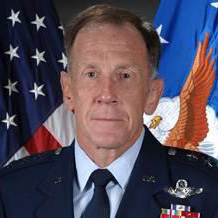
Guest Post: Lt. General Norman Seip (Ret.) -The Military’s Dependence on Oil is Putting Our Forces at Risk
 Lt. General Norman Seip (Ret.), 12th Air Force Commander
Lt. General Norman Seip (Ret.), 12th Air Force Commander
Our military’s single point of failure is its dependence on oil to support nearly all of its transportation needs. As the single largest purchaser of petroleum-based fuel in the world, burning through about 325,000 barrels of fuel per day, our military’s dependence on oil poses large security risks that must be mitigated to support a new generation of soldiers, sailors, airmen, and marines.
As long as the U.S. military is beholden to volatile global oil supplies, our forces will remain vulnerable. From a financial standpoint, our military’s fixed budget is susceptible to unbudgeted oil costs. Last year unbudgeted fuel costs had the effect of diverting over $2 billion of funds away from military operations. This is money that should be used to protect our forces and our nation, not to buy oil.
Global demand and political instability in oil producing regions are the x-factors determining global oil prices that we cannot predict or control. (Examples: tensions with Iran, the Euro crisis, weighing demand in China). Unfortunately, the rise in domestic oil production will not be enough to solve oil volatility. A recent letter by Military Leaders to Congress noted that “Even if we flood the market with every drop of oil in both our proven and strategic reserves, it will not be enough to offset rising global demand.” Unbudgeted costs will continue as global oil prices rise and remain volatile.
Altering our military’s dependence on oil is not just about saving money though -it is about saving lives. The continuous requirement to protect oil supplies in dangerous regions of the world puts our brave men and women in harm’s way each and every day. With political tensions rising in the Persian Gulf, the risks to our military forces and to our national security continue to rise.
To mitigate these strategic risks, our military has begun the transition to alternative fuels. Alternative fuel options would enhance our energy security and national security by allowing our military to move away from protecting fuel supplies as well as minimizing the impact that volatile oil prices have on each of the services’ readiness.
The Air Force and the Navy both have established goals to source 50 percent of their fuel requirements from alternative fuels by 2020. A large part of this plan is the use of drop-in-fuels that can be mixed with oil to operate aircraft like the F-15E Strike Eagle and F/A-18 Hornet as well as vehicles like the Humvee.
Our military is the greatest in the world in part because we equip our service men and women with the most advanced technology. The DoD and other government agencies have historically been market makers for advancing military proven technologies. The oil and gasoline industry developed and matured over time with government purchases, tax breaks and economic incentives. We owe the biofuel industry the same considerations. Biofuels, like petroleum fuels, should have the opportunity to prove their utility and cost effectiveness in a large commercial market. To provide such an opportunity the DoD has set forth ambitious but well thought out goals and matching plans to directly invest in the biofuels industry.
However, the DoD’s efforts are in trouble. The House Armed Services Committee approved an amendment in the DoD’s FY2013 budget that would prevent the DoD from using available funds to produce or procure alternative fuels if alternative fuel costs exceed the current costs of fossil fuels.
This amendment would effectively put a stranglehold on progress in addressing our military’s single point of failure. Our military should be permitted to mitigate the strategic risks posed by its dependence on oil, which are costing money and lives. To do so, we must invest in alternative fuels. The future of military fuels is in biofuels, an industry we must encourage to grow and to compete in the open market. It is the right thing to do for our sons and daughters who so proudly wear the uniform and it is the right thing to do for our nation.
Lt. General Norman Seip is a member of the Consensus for American Security Initiative





